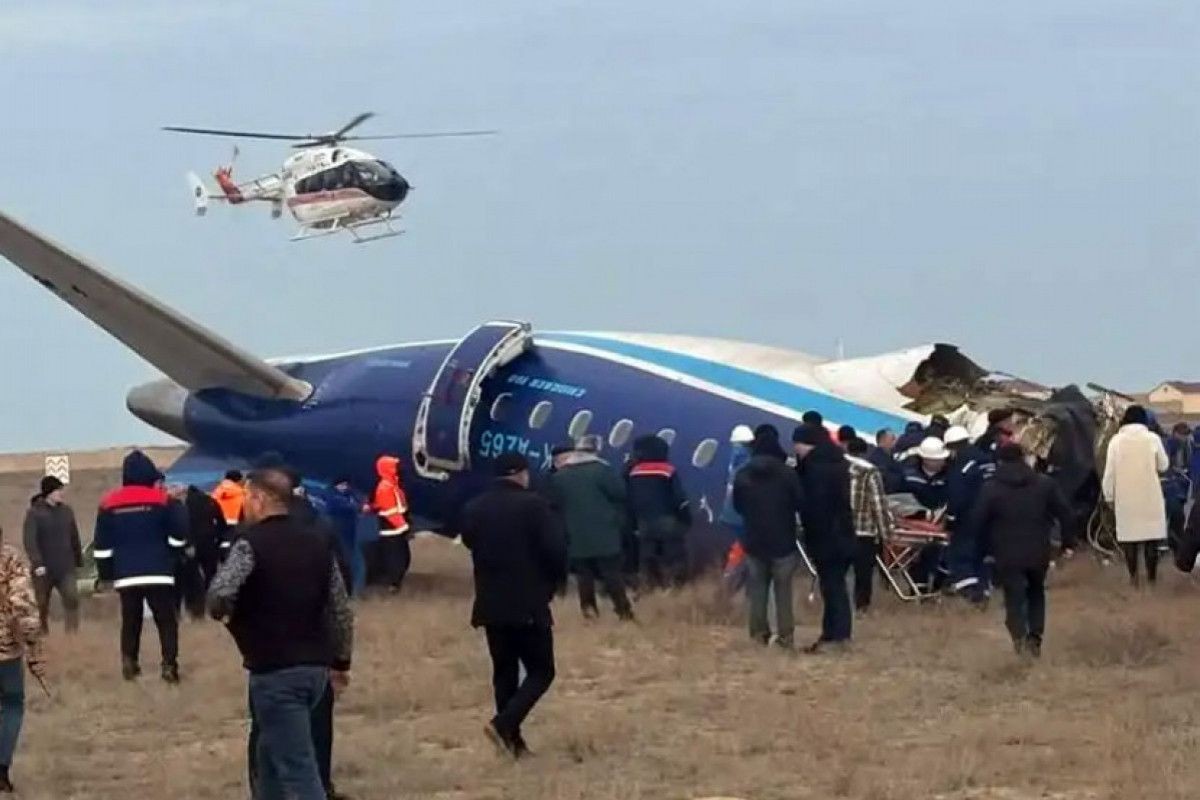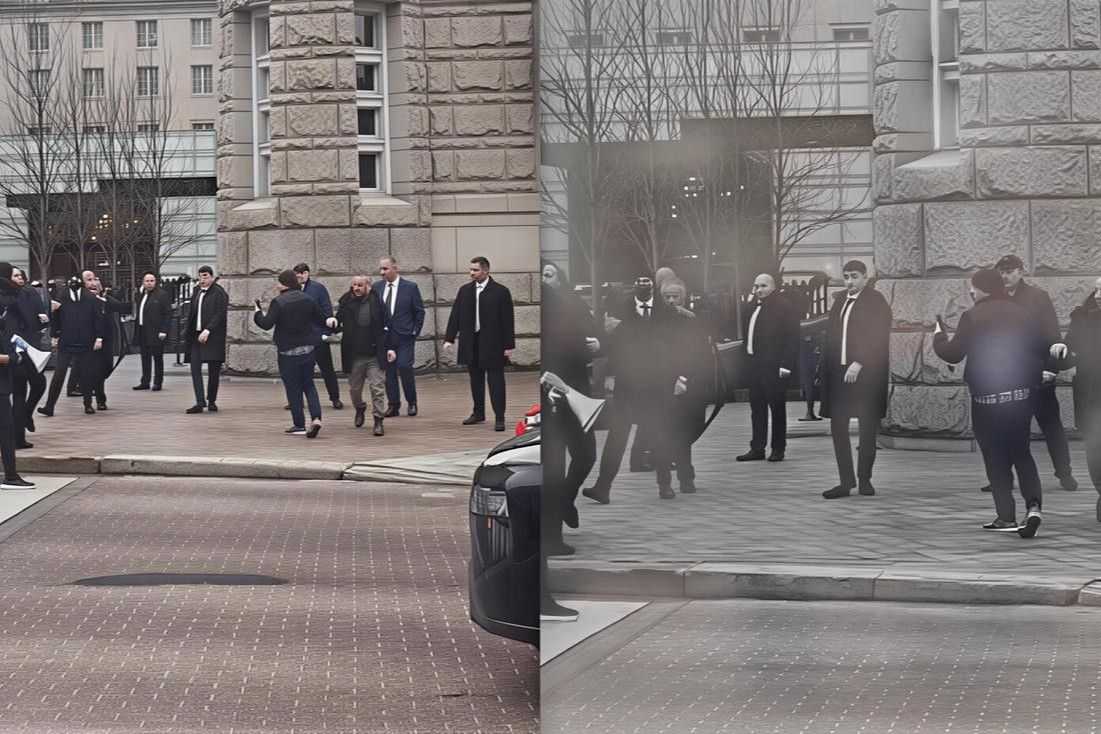Azerbaijani media releases ‘evidence’ of Russia shooting down AZAL plane amidst rising tensions

On Tuesday, the pro-government Azerbaijani media outlet Minval released purported recordings of Russian officer Dmitry Paliduchuk receiving orders to open fire on the Azerbaijan Airlines passenger jet that crashed in Kazakhstan in December 2024, killing 38 people.
The alleged audio recordings, which were accompanied with a handwritten letter supposedly from Paliduchuk, were the clearest piece of evidence made public so far to corroborate Baku’s claims that Russia was responsible for the deadly crash.
Minval acknowledged it could not corroborate the authenticity of the material, but the Russian independent media outlet The Insider said it appeared to be authentic.
Separately, the Azerbaijani Prosecutor General’s office said that a criminal case had been opened in connection to the crash, and that the results of ongoing investigations should be revealed ‘soon’.
Baku has previously taken issue with the long delays from the Russian side regarding the investigation, as well as the preliminary findings not being relayed, which some in Azerbaijani media have said is a sign of disrespect.
Arrests, accusations, and increasingly harsh criticism
The release of the audio recordings came amidst a sharp deterioration in relations between Azerbaijan and Russia in recent days, spurred on by a mass police raid in Russia’s Yekaterinburg that resulted in the deaths of two ethnic Azerbaijanis and the arrest of around 50 others.
Baku has said that brothers Ziyaddin and Huseyn Safarov were beaten to death with ‘extreme cruelty’ by Russian law enforcement officers, backing up its allegations with reports from a medical examiner. In contrast, Russia has claimed that the Safarov brothers died of natural causes.
Tensions quickly escalated in the following days, with Azerbaijan issuing a formal complaint to Russia, cancelling all Russia-related cultural events, and arresting a number of Russian journalists accused of espionage.
On Tuesday, Azerbaijani President Ilham Aliyev held a phone call with his Ukrainian counterpart Volodymyr Zelenskyi, where the two leaders discussed the deaths of the Safarov brothers, among other issues.
I spoke with President of Azerbaijan Ilham Aliyev @presidentaz and thanked him for his support of Ukraine, our people, and our territorial integrity. I also expressed Ukraine’s clear support in the situation where Russia is brutalizing Azerbaijani citizens and threatening the… pic.twitter.com/oGiIY2sWXP
— Volodymyr Zelenskyy / Володимир Зеленський (@ZelenskyyUa) July 1, 2025
Others, including Peter Michalko, the EU’s ambassador to Azerbaijan, also weighed in on the issue.
I am deeply concerned by the reports of violence, torture and inhuman treatment against ethnic Azerbaijanis in Russia, leading even to deaths, committed by Russian security forces. My thoughts are with the victims and their families.
— Peter Michalko (@MichalkoPeter) June 30, 2025
In addition, also on Tuesday, Azerbaijani authorities said a group of Russian nationals had been arrested in the country on suspicion of drug trafficking and committing cyber crimes.
Later in the day, Azerbaijan released photos of the detainees, many of whom showed visible signs of injuries, as well as footage of the heavily armed and masked police officers who carried out the raid.
Popular Russian journalists and social media accounts quickly criticised the photos, with some calling it a ‘dehumanising shitshow’ and others claiming they were just random Russians — not criminals — who were arrested in Baku in order to stage a public ‘humiliation’ spectacle.
After Russian criticism of the series of events perceived in Moscow as anti-Russian, the Azerbaijani Foreign Ministry released a statement calling on the Kremlin not to interfere in its domestic affairs.
Other signs of a more systematic backlash against Russia in Azerbaijan also appeared, as unverified reports surfaced claiming that Russian-language schools would soon be shut down in the country.
Later on Wednesday, the Azerbaijani Foreign Ministry officially summoned Russian Ambassador Mikhail Yevdokimov.

Russia responds
There was also a corresponding reaction in Russia, with more arrests of ethnic Azerbaijanis, including high-profile members of the diaspora.
While the Russian government did not explicitly state the new wave of arrests was connected to the ongoing tensions, it was quickly viewed as a form of retaliation.
And now Russian security forces are retaliating by detaining leading Azeri businessmen resident in Russia. https://t.co/xn7vTweCaP pic.twitter.com/PQMkR9uTM2
— Yaroslav Trofimov (@yarotrof) July 1, 2025
At the same time, Russian propagandists expressed outrage at Baku’s actions and urged an appropriate response.
Television host Sergei Mardan wrote on his Telegram channel that ‘Baku has always been a Russian city’ in a message containing racist comments about Azerbaijanis.
‘It’s high time to think about the safety of navigation and oil extraction in the Caspian Sea’, Mardan added.
Vladimir Solovyov, one of the most well-known Russian propagandists, also appeared to threaten Azerbaijan on his television show.
Amid rising tensions between Russia and Azerbaijan, Russian propagandist Solovyov, as he usually does, has begun threatening Azerbaijan.
— WarTranslated (@wartranslated) July 2, 2025
Relations between the two countries are rapidly deteriorating following ethnic raids in Russia and reciprocal detentions of Russians in… pic.twitter.com/4OdEQYDOsa
Official representatives, such as Foreign Ministry spokesperson Maria Zakharova, took a slightly different approach, saying on Tuesday that ‘friendly relations between our two nations are very important’, but added that ‘those who are seeking to disrupt them should think twice before acting’.
Kremlin spokesperson Dmitry Peskov said that Russia would ‘protect the legitimate interests of our citizens through diplomacy’, and also sought to blame outside forces.
Apparently referring to Zelenskyi’s call with Aliyev, Peskov claimed that ‘Ukraine will do everything possible to add fuel to the fire of this situation and provoke the Azerbaijani side into taking emotional action’.
‘This is easy to predict. Russia has never threatened and does not threaten Azerbaijan’, Peskov added.











